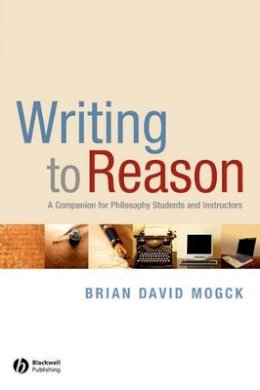
Stock image for illustration purposes only - book cover, edition or condition may vary.
Writing To Reason: A Companion for Philosophy Students and Instructors
Brian David Mogck
€ 30.78
FREE Delivery in Ireland
Description for Writing To Reason: A Companion for Philosophy Students and Instructors
Paperback. Writing to Reason presents the principles of writing a clear and well-argued philosophy paper in an easily-referenced numerical format, which facilitates efficient grading and clearer communication between instructors and students. Num Pages: 160 pages, black & white illustrations. BIC Classification: HP. Category: (P) Professional & Vocational. Dimension: 154 x 229 x 12. Weight in Grams: 248.
Writing to Reason presents the principles of writing a clear and well-argued philosophy paper in an easily-referenced numerical format, which facilitates efficient grading and clearer communication between instructors and students.
- Points out the most common problems students have achieving these objectives
- Increases efficiencies for instructors in grading papers
- Presents students with clearer information, objectivity, and transparency about their graded results
- Facilitates clearer communication between instructors and students
Product Details
Format
Paperback
Publication date
2008
Publisher
John Wiley and Sons Ltd United Kingdom
Number of pages
160
Condition
New
Number of Pages
158
Place of Publication
Hoboken, United Kingdom
ISBN
9781405170994
SKU
V9781405170994
Shipping Time
Usually ships in 7 to 11 working days
Ref
99-50
About Brian David Mogck
Brian David Mogck is the author of Is Logic Syntax of Language?: Carnap’s Programme, Gödel’s Critique, and Wittgenstein’s Evasion. He earned a PhD in philosophy from Emory University and taught at Emory, Spelman College, and Clayton College and State University. He received a JD from Columbia Law School, and is now an attorney in New York.
Reviews for Writing To Reason: A Companion for Philosophy Students and Instructors
“Long-suffering teachers of philosophy will love this volume. It offers sophisticated help for writers at various levels, expressed with simplicity and charm. Best of all, it is directed precisely to the improvement of philosophical writing and thinking.” – Joseph W. Koterski, S.J., Fordham University
